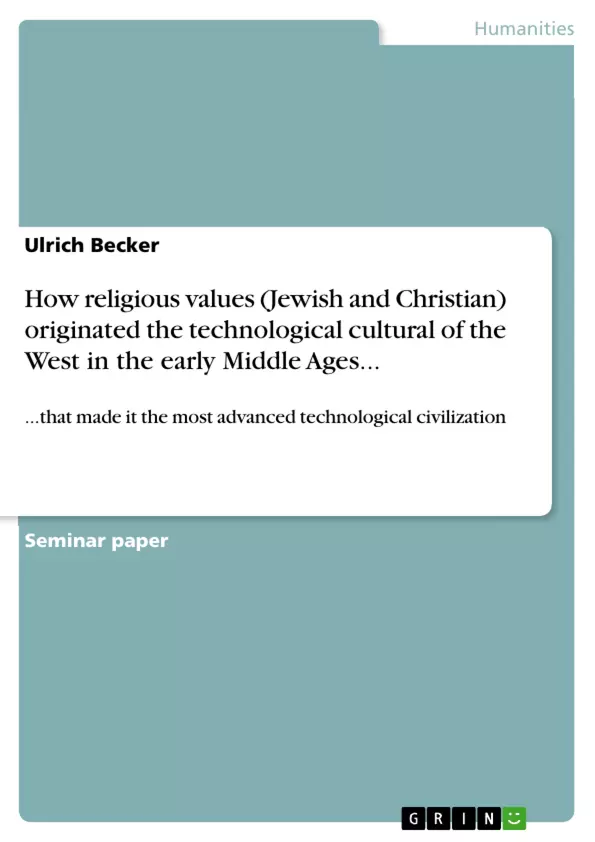Stating today that the Western Civilization is the most technological advanced civilization on earth and in history, will probably not draw many objections, but how and when did this happen? What made Western Europe outstrip the other great civilizations that long held technological superiority over it?
In this short essay I try to follow a thought of Professor Lynn Townsend White , seeing the intellectual condition of a society (namely religious values) as the main important factor for its technological development. Although many critics argue against White, downplaying religious value orientation as a possible cause, focusing on technological success of other civilizations in the Middle Ages, portraying the "technological mind" of western Europe as the consequence and not the cause of it's rapid technological growth or portraying the Western leading technological position as a kind of coincidence, I find them not convincing. To the contrary: the spread of ideas and their grave effects can have their basis in the minds of very few or even single persons, who convince a society to change or adapt their values Further, the wide spread and common borrowing of technological inventions in the medieval Eurasian cultures makes a search for an answer of the astonishing European success even more a question of society and intellectual attitude than the hardware inventions, since Byzantium, the Islamic world, India and China had in the 10th century the same or better technologies and inventions than as Western Europe. And of course on can argue that technological attitudes and pro-technological ideological changes in society where the product of technological progress and not it's cause, but first this would be hard to prove (since for example Monasticism and "Ora et Labora" came before the great technological progress of Western Europe) and second this leaves the question open what then caused the groundbreaking technological progress in Western Europe (and not in other cultures) in the first place?
Inhaltsverzeichnis (Table of Contents)
- .0. Introduction and presenting the question
- .1. The technological and the anti-technological society
- .2. The adoption of technological values from Judaism to early Christianity
- .2.1. Why did it not happen in Byzantium (too)?
- 2.2. Hugh of Saint Victor – technology as a part of philosophy.
- 2.3. The periodical barriers of Western technological progress.
- .3. Conclusion
Zielsetzung und Themenschwerpunkte (Objectives and Key Themes)
This essay aims to explore the origins of Western technological advancement during the early Middle Ages, focusing on the influence of Jewish and Christian religious values. It challenges the common view of Western Europe as a technologically advanced society, exploring the historical context and the role of religious ideology in shaping its technological development.
- The impact of Jewish and Christian religious values on the development of Western technology.
- The contrast between the technological and anti-technological societies, specifically the Greek-Roman world and Western Europe.
- The role of work and craftsmanship in Jewish and Christian communities.
- The influence of the "Protestant work ethic" in the context of medieval society.
- The comparison of Western Europe's technological progress to that of other civilizations, including Byzantium, the Islamic world, India, and China.
Zusammenfassung der Kapitel (Chapter Summaries)
The introduction presents the argument that Western Europe's technological advancement can be attributed to its unique religious values. The essay examines the historical context of Western technological progress and challenges common arguments against the influence of religious ideology.
The first chapter analyzes the contrast between the technological and anti-technological societies. It examines the Greek-Roman world, highlighting its negative view of work and craftsmanship, and contrasts it with the Jewish community's positive outlook on labor and technology.
The second chapter focuses on the adoption of technological values from Judaism to early Christianity. It explores the influence of Jewish religious beliefs on the development of Western technology and the subsequent influence of Christianity on the same.
Schlüsselwörter (Keywords)
This essay focuses on the interplay of religious values, technology, and societal development during the early Middle Ages. Key concepts include Jewish and Christian religious values, technological progress, societal attitudes towards work, the "Protestant work ethic," and the comparison of Western Europe's development to other civilizations.
- Quote paper
- Ulrich Becker (Author), 2008, How religious values (Jewish and Christian) originated the technological cultural of the West in the early Middle Ages..., Munich, GRIN Verlag, https://www.grin.com/document/114414



